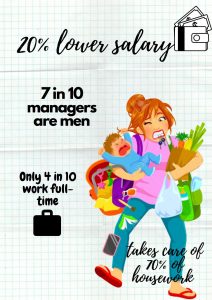
Over the years, women, globally, have been working hard to close the gender gap in terms of welfare rights, salary, policies and many other aspects. While the strive to gender equality has seen improvements in most developing countries over the years, it is astounding that the gender gap in Switzerland remains large. Just last June in 2019, Switzerland has seen one of its largest protests, with hundreds of thousands of Swiss women gathering on the streets to push for equal treatment and salary at workplace. This was the second, yet at an even larger scale, strike after the 1991 women’s strike. Listen to the podcast here if you are interested in the women’s strike of 1991.
History of gender inequality
Let’s take a look at how far Switzerland has progressed. Before 1978, Swiss women, and their children, are unable to retain their Swiss citizenship, should they marry a foreigner. It was only till 2003 that this was changed. In addition, Swiss women did not have voting rights until 1971. Rights to apply for maternity leave was only introduced in 2005. In an interesting take in his book “Swiss Watching”, Doccon Bewes highlighted how the availability of lady or ‘Madame’ portions in restaurants where food is priced at a lower cost and serving size in 2014 is evident to the sexism in daily Swiss life. He added that pricing of food reflected the acknowledgment of the lower wage received by women.



Unequal rights at workplace
Fast forward to today, representations of women in the Federal Parliament remains relatively low, with a third being female. Despite the constitutional article on equal rights being enforced, most Swiss women are still paid 20% less than their male counterparts for the same form of work. Majority of the women are employed part-time, with only 41% taking on full-time employment. With less than half of the female population being hired full-time, few could climb up the corporate ladder and build a career, explaining the low statistics of only 35% having managerial roles are women. The continuous lack of representation in political institutions translates to fewer representation of female voices as seen in the laws and business policies.

Reasons perpetuating gender inequality at work
1. Women are still bearing the brunt of doing the bulk of housework at home.
In a federal survey, most women reported doing more than 50% of the housework, with relatively little help from others. This scenario worsens to 70% as the couple have children. For women who are working part-time or full time, not only are they expected to perform at work, they are also expected to take care of the children and do the household chores when they get home after work. Gender equality seems to be a double-edge sword as they are expected to accomplish more at work and at home but are still recognized and paid lesser.
2. Childcare is expensive
Mothers seeking an extra hand to help out with childcare and housework need to be mentally and financially prepared. The shortage of affordable child care is particularly stressful for most mothers. It costs about 2000 to 2600 CHF per month to place one’s child in a day care. The average time required to register your child to a day care is about 6 to 8 months and being placed on a waiting list due to the lack of availability is common.Hiring a full-time nanny can cost minimally 3500CHF every month while hiring a cleaner could cost more than 100CHF a month. Should a woman wish to employ a foreign helper at a lower rate, she will have to go through the process of filing tedious paperwork and pay additional costs for the insurance of her helper. This will in turn make the whole process lengthy and more expensive.Apart from this, the cultural values revolves around women being the primary care givers, with general sentiments as skeptical of children being taken care by someone outside the family.The time consuming process, high expenses and traditional values drove most Swiss to be a stay-home mum.
3. Working mothers face discriminations
Working mothers continue to face discriminations related to maternity and pregnancy needs. In the Families and Generations Survey 2018, 70% of young women reported fearing that having a child will negatively impact their careers. 10% of the women faced discrimination after their maternity leave according a Swiss government-commissioned study in 2018. Working mothers have reportedly have their bonuses reduced, promotions delayed, asked to leave the company after they returned to the company upon their maternity leave. Many have resigned out of frustrations due to the unfair conditions and treatment. Here is an article on a case of women being unfairly treated in UBS, if you wish to read more about it.

Things are changing with the Internet…E-commerce as a solution?
While there are efforts to level the playing field for Swiss women such as cantons working to have more affordable child care and the introduction of 2 weeks paternity leave for fathers to help out, more could be done. Indeed, the advent of the Internet has opened up more opportunities to level the field as we see more alternative forms of work and rising female entrepreneurs. Stay tuned and follow my upcoming posts to learn more about it!
*All statistics reflect data from 2019 and were retrieved from the Federal Office for Statistics and Federal Office for Statistics




A decent piece of analysis. A good lead-in to the introduction of employing digital means as a solution. Use of reliable source, audio and visuals spice up the read.
thank you! 🙂
Interesting post!
I was aware of the gender gap and discrimination in Switzerland, but thanks to this informative and well-organized post, I got to know more about it.
I wonder why men get paid 20% more than women. Is it because only men have the obligation to serve in the military and some companies count it as work experience?
Speaking of military service, it seems like Swiss men are also discriminated against in a different way?
thank you! That could be another interesting angle to look at. This is a debatable issue and more research needs to be done 😀
An interesting overview, Mei Qi. Switzerland may seem forward-looking but it is still a very conservative country. Even the most successful digital solutions are no substitute for national (or regional) policies.
Thanks! That is so true- ultimately, it is the mindset and attitude that drives the action and strategies taken. 🙂
Great read. Surprised that a forward-thinking country like Switzerland is still so far behind in promoting gender equality. Intrigued by the final take on how e-commerce could change things and would love to read more from you on that, especially in these difficult times.
thanks for your kind words, glad you like it:) my second posts is ready: https://blog.hslu.ch/majorobm/2020/03/27/msoh-5-online-business-ideas-female-entrepreneurs-making-best-covid-19-lockdown/